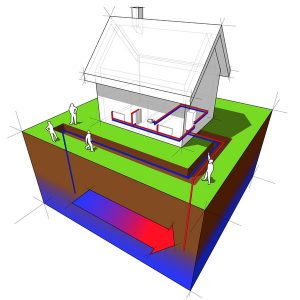 Heat pumps are renowned for their functionality and efficiency. They can be used as both heaters and air conditioners, and they do so more efficiently than both central air conditioners and furnaces.
Heat pumps are renowned for their functionality and efficiency. They can be used as both heaters and air conditioners, and they do so more efficiently than both central air conditioners and furnaces.
However, even in the heat pump category, there’s debate about which type of heat pump is best: air-source, or ground-source. Both have their pros and cons. In this post, we’ll go over the benefits and drawbacks of both types of heat pumps.
Air-Source and Ground-Source
The difference between these terms simply has to do with where the heat pump pulls their warmth from.
Air-source heat pumps are similar to normal air conditioners; they pull warmth from the air and move it into (or out of) your home.
Ground-source, however, pulls their warmth from several feet under the ground. The soil remains a consistent 50 degrees all year-round, making them a group source for warmth.
Cost and Ease of Installation
Air-Source
Traditional heat pumps and ductless mini-split systems are two types of air-source heat pumps that you can have installed in your home. Their installation isn’t anything that your typical air conditioning service in Fort Wayne, IN can’t handle.
If you already have a duct system in your home, a traditional heat pump will be easier to install. However, you may want to go with the ductless system since they offer a level of flexibility and individual control that you can’t have with ducts.
Ground-Source
Some homes simply aren’t able to have ground-source installed. A sufficient amount of ground needs to be available for them to be installed. To find out if your home is eligible, you’ll need to talk with an HVAC contractor. Since installation requires a certain amount of excavation, you can expect the cost of installation to be a little heavy up front.
These systems are most efficient when paired with duct systems, so you can expect them to operate more like a traditional heat pump than a ductless one.
Efficiency
Air-Source
Just by using a heat pump, you’re already using a much more efficient HVAC system than other types. The fact that heat pumps move warm air instead of creating it makes them consume less energy.
Ground-Source
While the same logic applies here, too, ground-source heat pumps are actually more efficient all year round. Air-source heat pumps can struggle to maintain efficiency at very low temperatures. The ground, however, will always remain a consistent temperature.
Longevity
Air-Source
Traditional heat pumps will last about the same span of time as a central AC or furnace—about 15 years. A ductless heat pump’s construction allows it to last a little longer, averaging in at about 20 years.
Ground-Source
For the geothermal heat pump, you have to consider two different components: the underground loops, and the heat pump itself.
The loops will remain untouched underground, thus giving them an average life expectancy of 50 years!
However, the heat pump components will last just as long as a normal heat pump. You can expect about 15 years of life from them.
